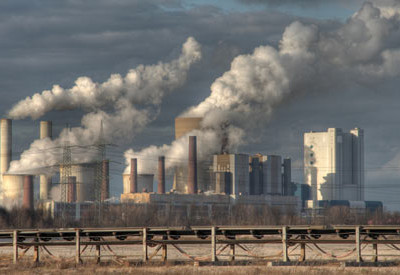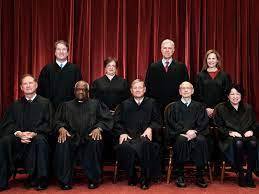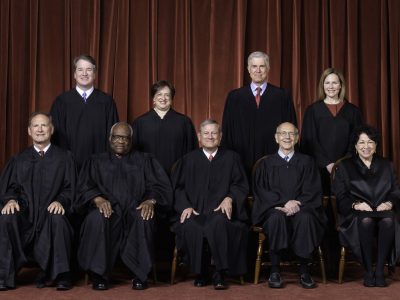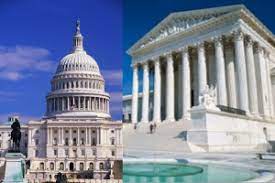Supreme Court
Major Questions About Today’s Big Climate Case
Here’s what you need to know about today’s oral argument in W. Va. v. EPA
The Supreme Court is hearing oral argument this morning in West Virginia v. EPA. The case is a challenge by the coal industry and coal states to EPA’s power to limit carbon emissions by power plants. Here’s what to look for today. Q: What is the case about? A: In practical terms, the question is what EPA …
Continue reading “Major Questions About Today’s Big Climate Case”
CONTINUE READINGWhich Front Runner Would Be Better for the Environment?
The three front runners have track records, but they’re not easy to interpret.
Currently, the press seems to view Judges Michelle Childs, Ketanji Brown Jackson, and Leondra Kruger as the front runners to replace Breyer. That may shift over the next month, but it seems worthwhile to give these three a closer look. They’ve all decided environmental cases while on the bench. I assume most readers don’t want …
Continue reading “Which Front Runner Would Be Better for the Environment?”
CONTINUE READINGJustice Breyer’s Nuanced Voice in Environmental Law
In a thoughtful, undramatic way, Breyer has turned out to be a valuable supporter for environmental regulation.
Given Justice Breyer’s announced retirement, it seems like a good time to assess his contribution to environmental law. When Bill Clinton nominated him for the Supreme Court, there was a great deal of uneasiness among environmentalists about Justice Breyer. As an academic, he had sounded a cautious note about government regulation, calling for more deliberation …
Continue reading “Justice Breyer’s Nuanced Voice in Environmental Law”
CONTINUE READINGMore on How the Vaccine Mandate Cases May Impact Climate Policy
How much is the Court likely to prune back EPA’s powers?
In a Friday post, I sketched some thoughts about how the Supreme Court’s vaccine mandate rulings might impact EPA’s power to control carbon emissions. I think it’s worth unpacking both the Court’s opinions a little more and the issues at stake in a pending climate change case, West Virginia v. EPA. The Court ruled in …
Continue reading “More on How the Vaccine Mandate Cases May Impact Climate Policy”
CONTINUE READINGToday’s Vaccine Cases: Implications for Climate Change Regulation
Today’s ruling are (somewhat) good news in terms of West Virginia v. EPA?
Today, the Court’s conservative Justices split the difference in two cases involving vaccine mandates, striking down OSHA’s mandate but upholding a more limited mandate for healthcare workers. The cases also split the conservative Justices themselves, with three hardliners (Thomas, Alito, and Gorsuch) seeking a more activist ruling in the OSHA case and dissenting in the …
Continue reading “Today’s Vaccine Cases: Implications for Climate Change Regulation”
CONTINUE READING2022: The Year Ahead
Here are the five biggest things to watch for.
There will be a lot going on this year in the environmental sphere. I wanted to focus on a few big things to keep an eye on, rather than trying to give a long, comprehensive survey. Here are the five biggest things to watch for: Midterm elections. As of now, things are looking very good …
Continue reading “2022: The Year Ahead”
CONTINUE READINGMajor Questions About the Major Questions Doctrine
You may not have heard of this doctrine but it’s a big threat to innovative regulations.
Unless you’re deeply immersed in administrative law, you may not have heard of the major questions doctrine. It’s a legal theory that conservative judges have used with increasing rigor to block important regulatory initiatives. The doctrine places special obstacles on agency regulations of issues of “major economic and political significance.” In its initial outing, the …
Continue reading “Major Questions About the Major Questions Doctrine”
CONTINUE READINGA Bad Week for Biden, and for Climate Action
First House progressives, and next conservative Justices, poked a stick in the spokes.
President Biden hoped to go to the international climate summit in Glasgow with momentum behind him. He wanted to reestablish US credibility with concrete progress on climate change. Instead, the ability of the US to take action on climate change is shrouded in doubt. Biden suffered an embarrassing defeat at the hands of members of …
Continue reading “A Bad Week for Biden, and for Climate Action”
CONTINUE READINGEnvironmentalism and the Supreme Court
Some cases belong to the environmentalist legal canon, others to an anti-canon of reviled precedents.
Every field has its texts that form part of its intellectual canon, and others that form a kind of anti-canon of rejected ideas. The same is true in environmental law. The issue goes beyond which side wins. From the pro-environmental side of things, some Supreme Court rulings form guideposts to rely on, whereas others represent …
Continue reading “Environmentalism and the Supreme Court”
CONTINUE READINGThe Illusions of Takings Law
Nothing is as it seems, when the issue is whether a regulation is a “taking” of property.
For the last century, the Supreme Court has tried to operationalize the idea that a government regulation can be so burdensome that it amounts to a seizure of property. In the process, it has created a house of mirrors, a maze in which nothing is as it seems. Rules that appear crisp and clear turn …
Continue reading “The Illusions of Takings Law”
CONTINUE READING











